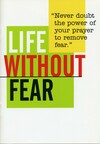

Are you sure?
This bookmark will be removed from all folders and any saved notes will be permanently removed.
Terrorism, counterterrorism, and prayer
Law enforcement officers are, at this very moment, tracking down terrorists in many parts of the world. The purpose? To apprehend and punish the perpetrators of unthinkable crimes against humanity—bombings, gas attacks, hijackings, slaughters. Cities in the Middle East, Japan, and heartland America are on the alert with counterterrorist activities: checkpoints, complex security systems, weapons-detection devices. At New York City's World Trade Center alone (scene of a 1993 bombing), these anti-terrorist measures run up a yearly cost of about $25 million (see Richard Lacayo, "How Safe is Safe?" Time, May 1, 1995).
Well-intentioned and necessary as all these efforts may be, though, they're not enough to make people in airports and office buildings and embassies and subways and schoolyards feel safe. This is especially true in areas where terrorists have once struck.
A few days after the recent Oklahoma City bombing that killed at least 167 children, men, and women, I talked to a young law student living there. "It's scary," he said. "I don't want to go downtown. Maybe in a few months, but not now." When I asked him if people there were praying, he said, "Sure, I think everybody is."
Enjoy 1 free Sentinel article or audio program each month, including content from 1898 to today.
JSH Collections
This article is included in:
1997 - PAMPHLET
Life without fear
JSH-Online has hundreds of pamphlets, anthologies, and special editions for you to discover.

June 26, 1995 issue
View Issue-
Building walls?
Cyprian Leslie Kheswa
-
I fill the void
Robert Ennemoser
-
True nourishment—or the chemistry of food
Judith H. Hedrick
-
"Give me some peace and quiet"
Kathryn Lynn Fish
-
Spirituality in children
Kim Shippey
-
Dear Sentinel,
with contributions from Anne Sobrin, Mark J. Sobrin, Elise Marguerite Windal LaVanchy
-
Stop breeding hate
Anthony D. T. Thomas
-
Finding freedom through forgiveness
Barbara Beth Whitewater
-
Terrorism, counterterrorism, and prayer
Mary Metzner Trammell
-
What about forgiveness?
Richard C. Bergenheim
-
How wonderfully reassuring it is to know that encouragement,...
David J. Goldsmith
-
What a blessing Christian Science has been in my life! Each...
Katherine Monroe
-
For more than twenty years I had attacks of migraine that...
Alcidema Franco Bueno Torres


